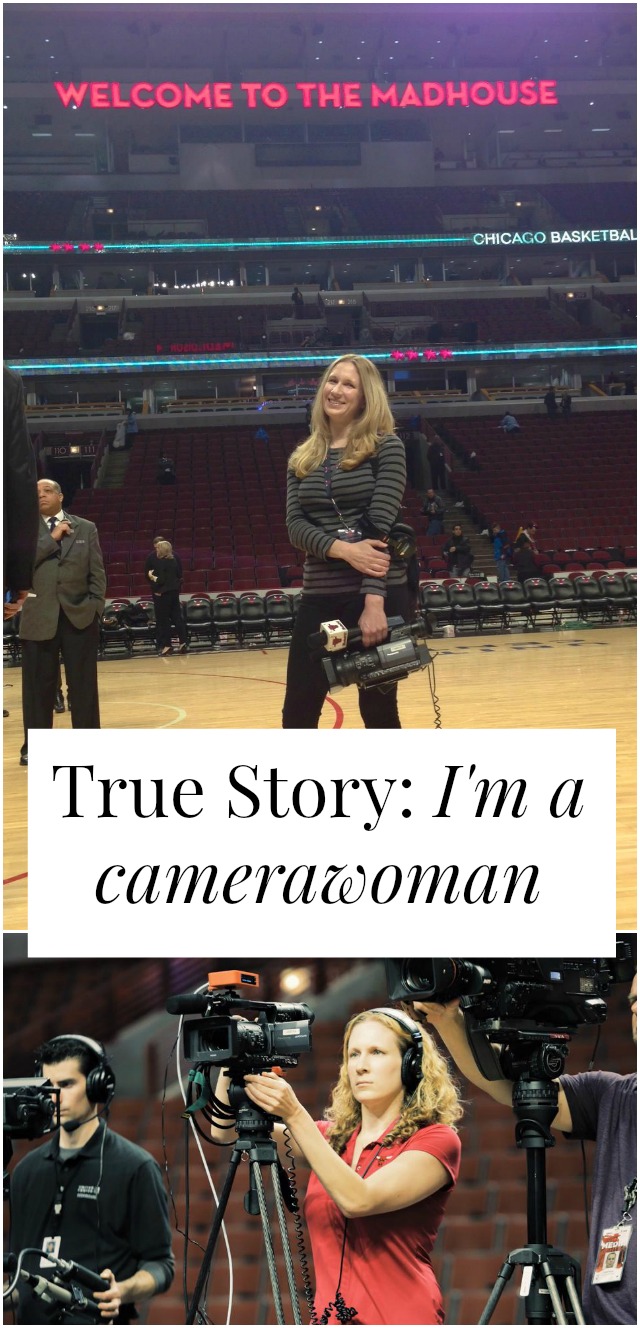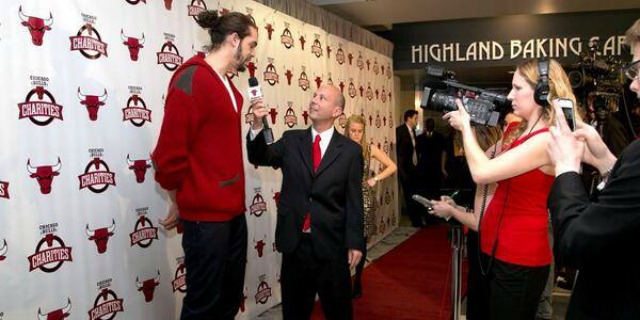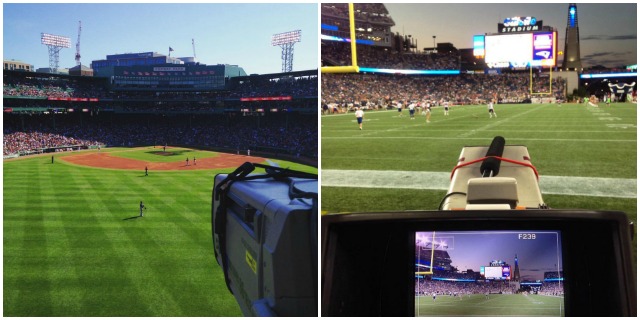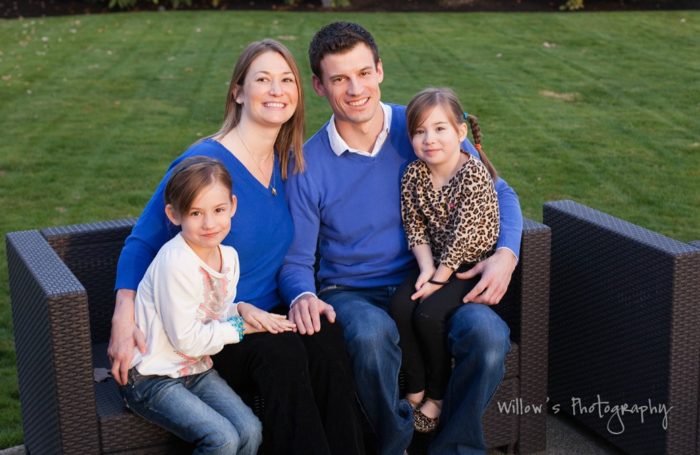
What’s it like to work as a camera woman? Particularly a camerawoman in sport where the vast majority of your co-workers are male? Today Kate is telling us all about it – from filming Oprah segments to shooting the Chicago Bulls basketball team. Fascinating!
Tell us a bit about yourself!
I’m Kate! I’m from Michigan originally, but I have lived and worked around the country, in Los Angeles, San Antonio, Chicago, and currently Boston (where I went to college). I’m 35 years old, and I love to travel – as evidenced by my nomadic lifestyle – and to take pictures of my teddy bear. I also recently got into rock climbing, and I am now full-on obsessed.
As a camera operator, I’ve worked on a huge variety of productions. I spent six seasons as a videographer for the Chicago Bulls and four seasons shooting on the reality show Big Brother. I’ve freelanced on everything from a segment for Oprah, features for ESPN, shows for HGTV, coverage of Obama’s first victory speech, and so much more.
How did you get into camera work?
When I was about to start as a freshman in high school, my advisor thought I didn’t have any fun electives in my class schedule, so she suggested video production. I immediately fell in love with it, then based my college choice on where I could do the most hands-on work during school. I attended Emerson College in Boston and majored in TV/Video.
Emerson offers a semester in Los Angeles program, so I spent my final semester in LA interning at a small production company. They focused on extreme sports, like skiing, snowboarding, beach volleyball, and even bull riding and lumberjack sports.
I started as an assistant editor and graphics operator, but I knew that I wanted to do camera, so I took every opportunity to do that. Eventually, I stopped working at that company to go freelance when I got my first steady camera job for the reality show Big Brother on CBS.
Who usually employees camera people? And are you usually a full time employee? A freelancer? How does that work?
Life as a camera op is almost always the freelance life. Though you can find full-time jobs for networks (those can be really hard to get as people stay in them for years and years), and you could also go the corporate route, most production work is freelance.
Usually I’ll be hired by a crew or production company, and sometimes I get booked several weeks or more in advance. I’ll also often get called for last-minute gigs, so it can be hard to make plans – which is okay by me, since I prefer to be spontaneous in just about everything!

Can you walk us through an average day at work?
My day completely depends on what kind of shoot it is – whether out in the field shooting a story, doing a show in a studio, or covering a sporting event in a stadium.
For a sporting event, I’ll generally show up sometime in the early afternoon for a night game. I head to the production truck to meet the rest of the crew and figure out what the plan is for the day. Then all the camera ops will load up the gear on carts and set up the cameras in positions around the stadium.
After a couple of hours of setting up, we get on headset and fax the cameras, which means check that everything is working properly with the technical director and engineers. Then we’ll usually have a camera meeting with the director, who is in charge of literally calling the shots. He (it’s almost always a he, though there are a few awesome women who have broken into the boys club) gives us our assignments for all the different situations that might occur in the game.
We also go over the players we want to focus on and any storylines we should be aware of. Then we have a meal break, and after that we’ll jump back on camera to shoot player warm-ups and often pre-tape the open of the show with the talent (aka the announcers).
Then it’s game time! For the next three hours or so, depending on the sport, we’re shooting the game. And once it’s over, we’re not done. We have to strike, or break down and pack up, all the cameras and cables and gear that we set up at the start of the day.
Once everything’s back on the production truck so it can drive away, that’s a wrap. Standard days are 10 hours, but it often goes beyond that, in which case, we get overtime.

In your opinion, what qualities does a good camera person posses?
The set of skills can be quite different, depending on what you’re shooting. You always need to have a good eye for framing a shot. For sports, you have to be able to react quickly, and pay attention to many different things at the same time. You have to follow the action of the game while listening to the director and also listening to what the announcers are talking about.
It also can be fairly physically demanding, especially if you’re doing handheld camera, where you’re running around with a heavy camera on your shoulder all day.
Could you give some examples of shows/events you think have particularly good camera work?
In terms of sports, the Super Bowl is always amazing. They also have a ridiculous number of cameras, so the ops get to really focus on specific things. I’ve also personally always been really impressed by the golf camera ops who follow the tee shot – that seems so difficult!
Camera work – especially camera work in sports – is a pretty male-dominated field. Any advice for other women looking to find camera work?
Be prepared to be the only girl in a crew full of guys. Things are changing, and it is more common to find other women on the crew, but it’s still a rarity, especially in the more technical positions, such as camera. Many times I have gotten surprised reactions when I show up and say that I am a camera op because they didn’t expect a woman in that position.
On the plus side, you’ll stand out as a girl, so if you do a good job, it’ll be easy to be remembered and hired again. On the other hand, I do feel like you have to prove yourself a little bit more. I have become very stubborn about carrying things, because I find that people will offer to help me more often than they would a man, but carrying the equipment is part of what I get paid to do!
I also have had many moments where fans have come up to me (cameras are often positioned in the stands) to tell me that it’s awesome to see a woman operating camera because they have never seen it before. This makes me feel a bit like a trailblazer. Just by being there and doing my job well, I am making it easier for the next generation of women to do this, too.
Are there any aspects of your craft you’re working to improve?
Production technology is always changing and improving at a really fast rate, so I’m constantly trying to stay up to speed with the new equipment. I also really like trying to shoot things that are new to me whenever I get the chance.
What do you love most about your work? What are the biggest challenges?
I love that my work is fast-paced and always something different. I love that I get to meet new people all the time. And, of course, I love the feeling of capturing a really great shot.
Being freelance can be a challenge, when it comes to both income and scheduling. I work a lot of holidays and weekends, but I also often have free time during the week, so even if it can be challenging sometimes, overall, I personally prefer the freedom of freelancing.
What have you learned from this that any of us could apply to our daily lives?
The biggest life lesson I’ve learned from my career as a camera operator is the importance of being adaptable. When you’re shooting live television, you never know what’s going to happen. I find that to be true in the way my career has progressed, too.
Being open to possibility and willing to change your plans allows for great things to happen, even if at first, something might seem like a disaster.
Thanks so much for sharing your story, Kate! Do you guys have any questions for her?
P.S. Interviews with a morning tv news anchor, a roadie, and a working musician!












Thanks for sharing, Kate!! This is a fascinating interview! I love that you got into the field so young and that it was totally by chance. I’m always interested in how people get onto unusual career paths, but I’m also interested by how small and seemingly insignificant decisions change the course of someone’s life.
Your description of the qualities of a good camera person makes me think the job must be so stressful. I watch a lot of sports and I’m in awe of how good the folks behind the cameras are. This is a small example, but when I go to a live football game, I am consistently faked out on running plays. 99.999% of the time, you professionals get it right and that is pretty darn impressive!
You’re so accomplished and you’ve done so many cool things already, but I’m dying to know- do you have a dream gig?
Also, finally, I just want to say your last sentence is excellent advice.